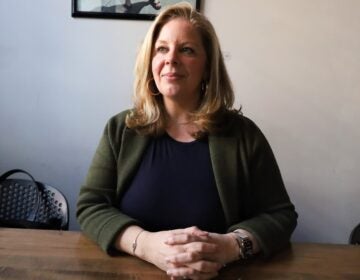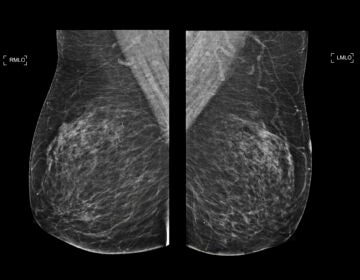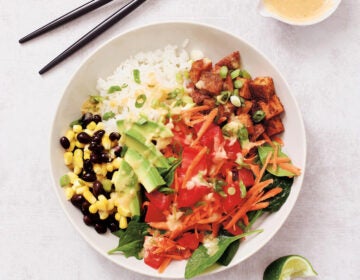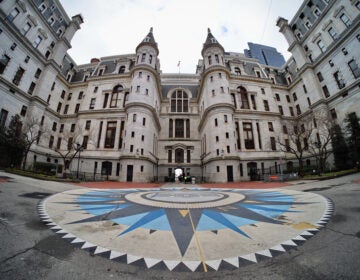A South Philly woman is providing access to menstrual, postpartum products, one shed at a time
Grab n’ Flow provides free, anonymous access to menstrual and postpartum products at three locations in South and West Philadelphia.
Listen 1:06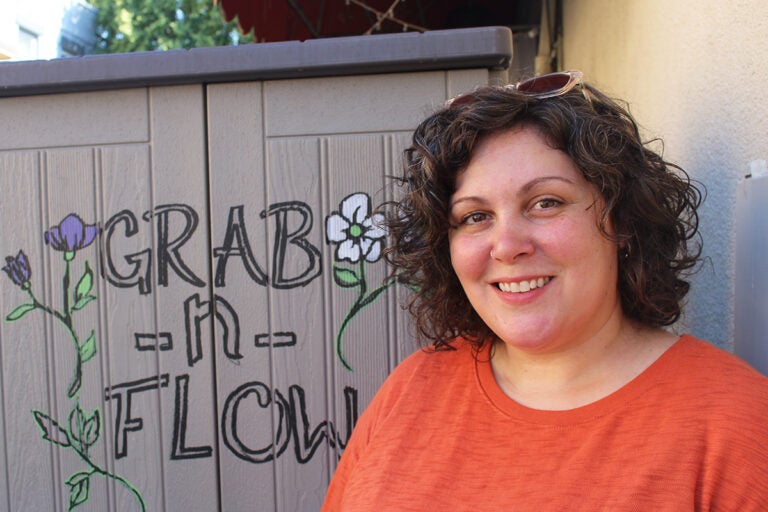
Shelley Aragoncillo founded Grab n' Flow in 2020, inspired by the community fridges and mutual aid that sustained many people during the COVID-19 public health emergency. (Emily Neil/WHYY)
From Philly and the Pa. suburbs to South Jersey and Delaware, what would you like WHYY News to cover? Let us know!
Shelley Aragoncillo gave birth to her child in March 2020, just as COVID-19 swept the world and Philadelphia commenced a monthslong shut down.
The hospital where she delivered her baby stocked her up with postpartum products, and Aragoncillo realized she had an “excess” of the birth recovery supplies. At the same time, she also noticed a demand for menstrual products as many people were financially struggling during the public health emergency.
“There were so many people online asking for pads and tampons and things like that,” Aragoncillo said. “So I just thought, if I can start a small shed and run it for as long as I can with my own funds, I’ll just use that as kind of an access point.”
Inspired by the community fridges and other mutual aid efforts springing up at the time, and informed by her decade-plus experience working in reproductive justice, Aragoncillo set up a shed in her neighborhood in South Philly. She began stocking it with postpartum products, pads, tampons and other menstrual supplies, and invited neighbors to contribute.
The community response, Aragoncillo said, was “incredible.”
“I had no idea people were so excited to speak about menstrual equity and postpartum care and things like that,” she said.

The original community shed at South Franklin and Tasker streets is still the flagship for Grab n’ Flow, which now stocks two other locations at the Lucien E. Blackwell West Philadelphia Regional Library and the Walnut Street West Library. In addition to partnering with The Free Library of Philadelphia, Grab n’ Flow has also been supported by the city of Philadelphia and Penn Medicine.
Aragoncillo plans to use an ongoing fundraiser for Grab n’ Flow to expand its locations.
“I want to try to get more community members involved, to maybe host sheds outside of their homes,” she said. “And so the GoFundMe is to cover storage unit fees, because while we do get product donations, the monetary donations definitely help to cover the kind of administrative stuff.”
Pads fly off the shelves
The flagship South Philly shed still receives dozens of visits each day from people picking up supplies, as well as other community members donating menstrual and postpartum products.
That location is meant to serve the area’s majority-immigrant community. Information posted on the inside of the shed doors is written in both English and Spanish, and Aragoncillo plans to soon provide translations into other languages, including Cambodian and Mandarin.
Pads go the fastest, and are more popular than tampons, Aragoncillo said. The rate of use shows just how in demand menstrual supplies are.
“It’s insane how much these products cost people,” Aragoncillo said.
In 1991, Pennsylvania became one of the first states to exempt sanitary napkins, tampons and other menstrual products that fall under the “paper goods” category from sales tax. As of May 2025, 18 states still charge a sales tax on period products, even though advocates argue they should be exempt as “essential goods.”
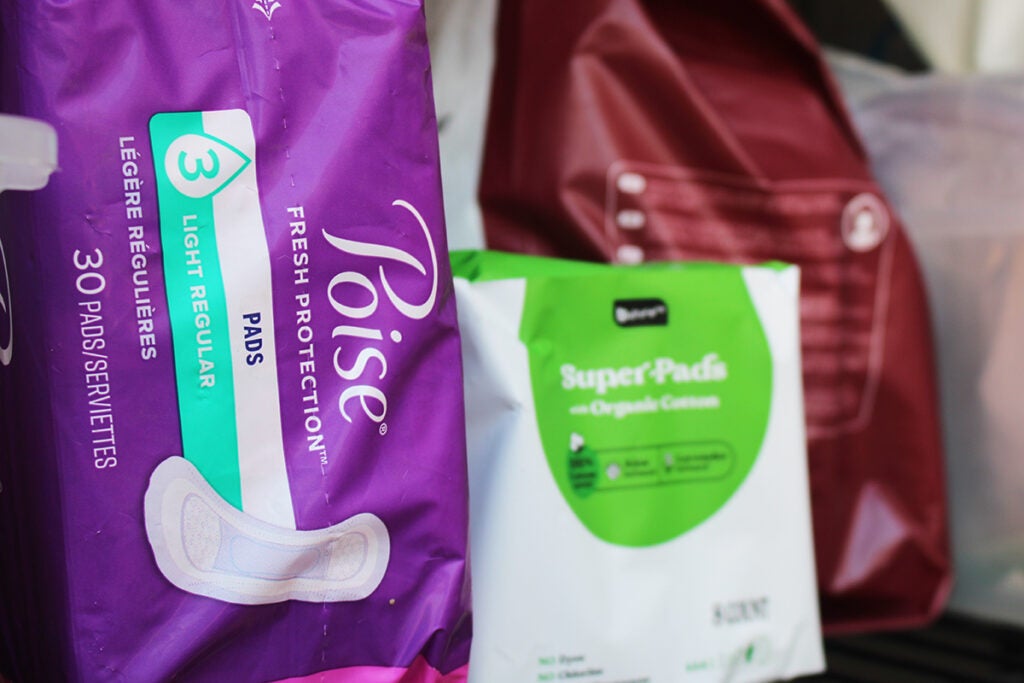
But even in Pennsylvania, menstrual products are prohibitively expensive for many people, and the Supplement Nutrition Assistance Program, or SNAP, and the federal supplemental nutrition program for women infants and children, known as WIC, do not cover the purchase of period products. It’s estimated that 1 in 4 students and 1 in 3 menstruating adults in the United States struggle to afford period products.
Aragoncillo said there are a number of local and national organizations already working in menstrual equity to provide people with months-worth of supplies. Grab n’ Flow serves as a more direct, emergency resource, with no questions asked.
“The goal of ours is just to kind of be a quick access point for people, super anonymous, literally, like, grab and go kind of thing,” she said.
The organization also works with clinics in the neighborhood to donate nursing pumps to undocumented and uninsured people. Aragoncillo said the pumps donated there “are going out instantly.”
“If the product is going, it’s needed,” she said. “The ultimate goal is to never need this, because then products would be accessible.”
Even after a massive recall in 2022 caused a shortage, baby formula remains expensive and is another in-demand product along with diapers at Grab n’ Flow.
Aragoncillo said anyone in need of baby formula should fill out a form on the website, since the product has to be temperature controlled and can’t be left out in the shed.
‘Manayunk Wingwomen’ support the mission with donation drive
Aragoncillo said donations from fellow community members are what keep the South Philly shed going, and the two library sheds are stocked thanks to fundraising efforts by a group of women business owners in Manayunk who dubbed themselves “The Manayunk Wing Women.”
When Brandy Deieso, owner of The Little Apple Gift Boutique, saw a TV news segment about Grab n’ Flow four years ago, she decided to rally Manayunk business owners to collect donations during March, in celebration of Women’s History Month and International Women’s Day.
The response has gotten “better and bigger” each year, Deieso said. This past March, during their fourth annual drive, more than 25 participating businesses collected 45 boxes worth of supplies for Grab n’ Flow, and more than $600 in cash donations for Women Against Abuse.
Participating businesses give out stickers with a special logo, a maxi pad with wings, to customers who donate supplies.
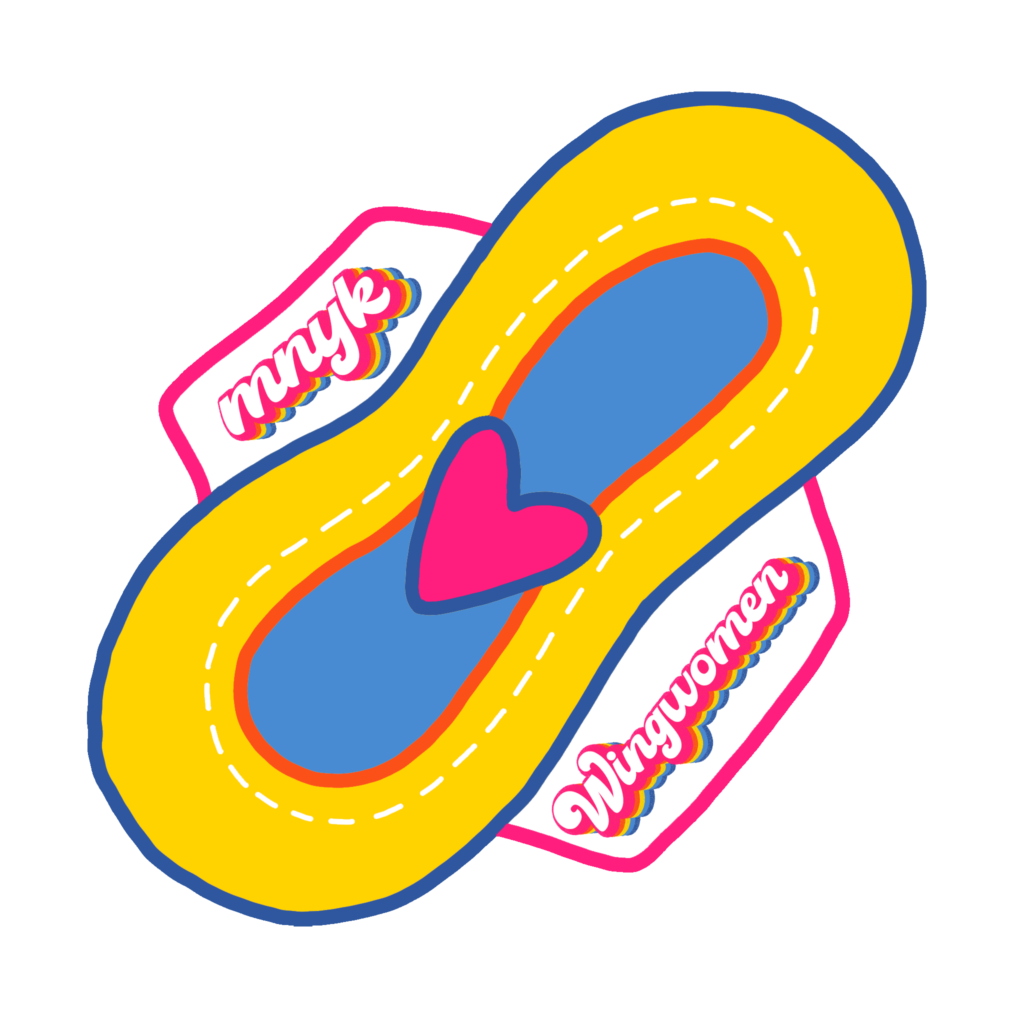
“It used to be a taboo topic,” Deieso said. “People would be embarrassed to bring in their box of tampons, maybe, or maxi pads. And even when we designed the logo … I was like, ‘Oh, are people even going to want to take these, are they going to be embarrassed? Are they not going to want to use this logo on their social media when we’re trying to promote this?’ But I feel like it’s really been embraced, and it’s given kind of like a power back to saying, ‘This is a real thing half of the population experiences each month.’”
Aragoncillo said she had to get a storage unit for all of the donations Deieso and her Manayunk Wingwomen team collected.
She said more people can get involved by donating to the fundraiser or filling out the contact form on the website.
“This has been running on a mutual aid model … for the four or five years that I’ve been doing this,” she said. “I have now transitioned to try to make this my full-time focus. I don’t make money off of this, so any funds that come in are going towards hopefully setting up more access points in communities.”

Get daily updates from WHYY News!
WHYY is your source for fact-based, in-depth journalism and information. As a nonprofit organization, we rely on financial support from readers like you. Please give today.




